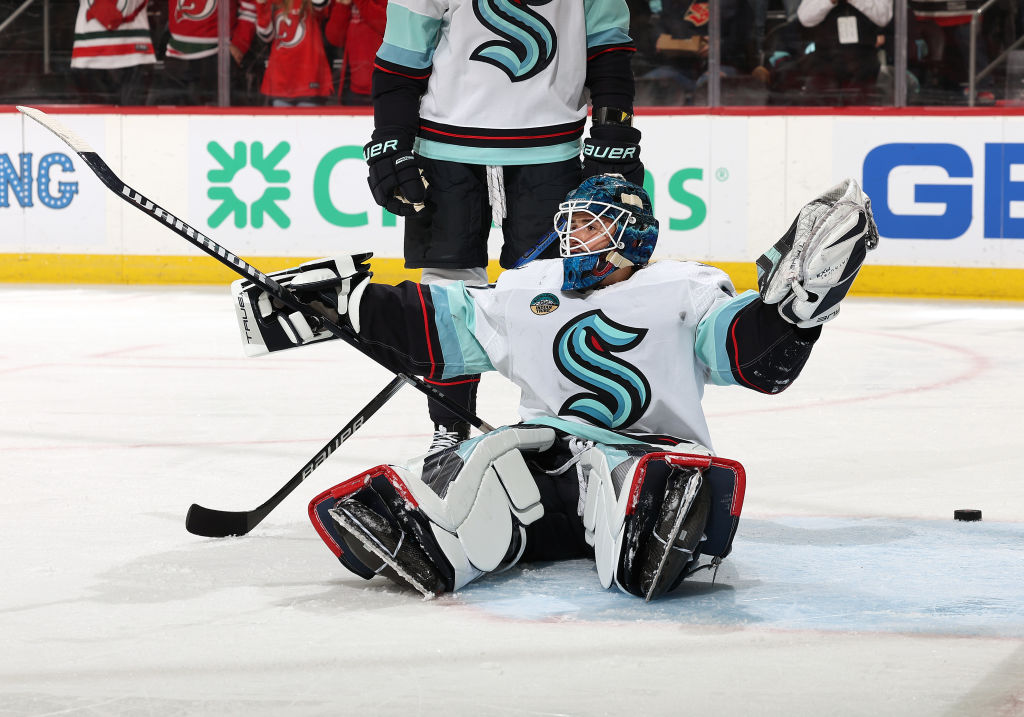Watching the first 60 minutes of Detroit-Seattle on Monday afternoon, it felt like every Red Wings goal was crafted specifically to taunt the Kraken about their shortcomings. The first was a big slapper by young defenseman Moritz Seider, a pillar of this franchise's slow rebuild drafted in the first round in 2019—a draft in which the NHL's latest expansion team was not yet mature enough to participate. Lucas Raymond cleaned up a rebound for the second—everything about Seider holds true for him, except swap defense for forward and 2019 for 2020. And on the third, it was Daniel Sprong, the Kraken's surprise scorer from last season, who in his first game back since leaving in free agency finished a two-on-one for the red and white.
Seattle matched all of these goals but fell to a Ben Chiarot winner in overtime. Chiarot's not all that enviable a piece, so the theme disintegrates there. But seeing Detroit, sixth-best record in the East, match up against Seattle, 11th-best record in the West, helped illuminate some of the Kraken's inherent handicaps, which have kept them from enjoying a Vegas-like rocket trip to the top of the league.
In the Kraken's first season, 2021–22, what projected to be a dull but mildly effective group of grinders got derailed by a shocking disaster in net. The following year, even if the goalie play didn't get that much better, some stout blue-lining and a flurry of unexpected sparks on offense shot them up 40 points and all the way into the second round of the playoffs. This year, however, has seen a step back. Joey Daccord has been virtuosic between the pipes after a strong year in the minors, and now that's what's keeping Seattle from sinking. The defense, meanwhile, has eroded just a bit, and the scoring of last year looks like a total fluke. What happened?
Well, Jared McCann was a prime candidate for regression after setting a career-high of 40 goals last season, but he's actually remained the team's top scorer at only a slightly slowed pace. It's everywhere else that the Kraken have lost ground. Matty Beniers is the crown jewel of the long-term plan, just 21 and coming off a Rookie of the Year win, but after playing 94 games last year he clearly hit a wall, and he's consigned to the dreaded "flashes of brilliance" as he's scored just eight times as a sophomore. Sprong, a total out-of-nowhere contributor last season, has been sprung, and the random shots the Kraken took at replacing his production—like former Edmonton underachiever Kailer Yamamoto—haven't provided meaningful returns. What's left are some very young players who hopefully have brighter futures, Tye Kartye chief among them; expansion draft remnants like Jaden Schwartz and Jordan Eberle, who didn't possess that elusive Vegas magic; and some perfectly acceptable guys they've maneuvered to get, like Eeli Tolvanen, Tomáš Tatar, or Oliver Bjorkstrand, who just had to suffer through not getting drafted at the all-star game. (They assigned the final four to different teams so nobody had to be officially picked last.)
How does a team manufacture a star? In most cases, you draft and develop, but the Kraken have only been drafting since 2021. Beniers is on the correct track, Shane Wright (2022) is still a mystery, and no other draftees have yet scored a goal for them. Another route is to sign a big-name free agent. The Kraken tried a half-measure of that with André Burakovsky after their first season, but he's rarely been able to get on the ice at full health. The other option would be lopsidedly winning a trade, like for example the Panthers did to grab Sam Reinhart. Ron Francis has in fact come out ahead on some trades, like the one that netted Sprong and the big draft-pick haul of his first deadline, but not to the extent that can swing his franchise's fortunes immediately.
Basically, Vegas threw off the whole grading curve for expansion teams, and the Kraken overperforming last season set unrealistic expectations for this one. Building a team from scratch, especially when you do it as deliberately as Seattle has, is time-consuming. Even after three years of construction, the bulk of the work still lies ahead.





